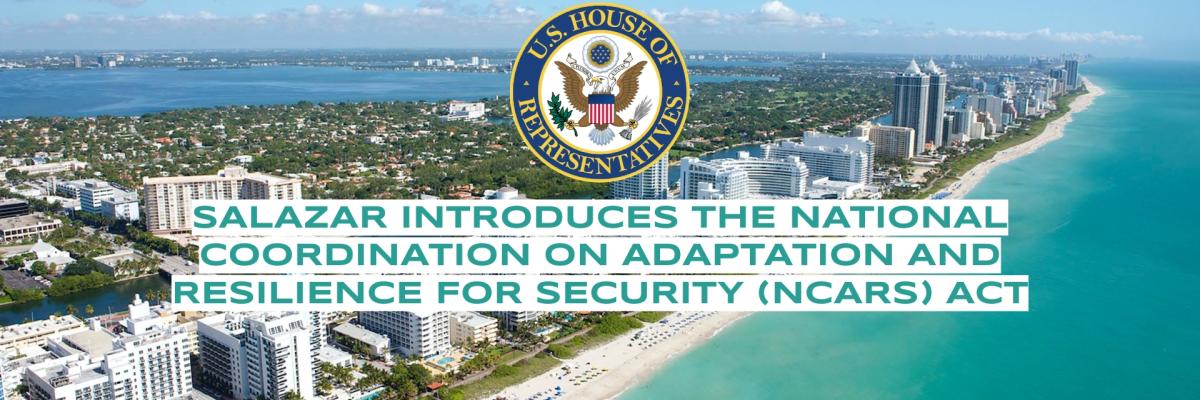Salazar Introduces the National Coordination on Adaptation and Resilience for Security (NCARS) Act

WASHINGTON, D.C. – Today, Reps. María Elvira Salazar (R-FL) and Scott Peters (D-CA) introduced the bipartisan National Coordination on Adaptation and Resilience for Security (NCARS) Act. This landmark legislation will create a national resilience strategy and protect Americans from natural disasters. Reps. Salazar and Peters are joined by Reps. John Curtis (R-UT) and Lisa Blunt Rochester (D-DE), and Senators Chris Coons (D-DE) and Lisa Murkowski (R-AK).
As Miami faces increasing risk from flooding and storms, the need to formulate and execute a strategic plan to protect us from extreme weather is greater than ever. South Florida faces unique climate and environmental challenges that must be addressed, like sea level rise and saltwater intrusion into the Everglades. Critically, Florida’s 27th congressional district is a coastal community in need of climate-resilient infrastructure to protect our future generations.
“Miami communities are at risk and are ground-zero for rising waters,” said Rep. Salazar. “We must come together to protect Florida families and improve disaster planning. I’m proud to lead the National Coordination on Adaptation and Resilience for Security (NCARS) Act to ensure we build stronger infrastructure and keep our communities safe.”
NCARS is necessary to consolidate government efforts and ensure efficiency in disaster planning. Currently, the federal government has a siloed approach to disaster mitigation and preparedness, with duplicative efforts spread across at least 17 federal agencies. Additionally, advance preparation is fiscally responsible. According to FEMA, every dollar we invest in climate resilience saves roughly $6 when disaster strikes. This investment is good for Miami and good for the United States.
Specifically, the National Coordination on Adaptation and Resilience for Security (NCARS) Act:
- Sets a National Adaptation and Resilience Strategy and an Implementation Plan with federal, state, local, private sector, and non-profit partners;
- Establishes a Chief Resilience Officer in the White House to implement the plan;
- Creates interagency working groups to streamline efforts and ensure accountability; and
- Creates a federal information hub to streamline resilience resources to communities.
“As we work to aggressively combat the climate crisis, we must also prepare our communities for the unavoidable devastation of climate change. In San Diego, this includes more frequent and intense wildfires, drought, heat waves, and rising sea levels that endanger the health, safety, and livelihoods of people in my district,” said Rep. Peters. “A robust national strategy led by a Chief Resilience Officer, instead of a patchwork of disparate efforts, will be essential for an effective response to the increasingly dangerous climate hazards our communities face.”
“A coordinated government strategy for resilience is critical to help vulnerable communities that face increasing risk from hurricanes, floods, winter storms, and other weather events,” said Senator Coons, co-chair of the bipartisan Senate Climate Solutions Caucus. “Having a Chief Resilience Officer in the White House, advised by a non-federal Partners Council, will improve accountability and fiscal responsibility in disaster preparedness, following the model of nearly a dozen states, including Florida, Louisiana, and South Carolina. Resilience is critical not only for Delaware, but for Americans in frontline communities across the nation.”
“Alaskan communities are facing an increasing number of damaging weather events bringing flooding, coastal erosion, severe winter storms, permafrost melt, and wildfires. Just this past year, communities across our state were impacted by several natural disasters that caused great damage to our infrastructure and put Alaskans lives at risk,” said Senator Murkowski. “I’m glad to be working once again with my colleague Senator Coons on bipartisan legislation to appoint a Chief Resilience Officer to develop and implement a unified National Adaptation and Resilience Strategy, with the input of partners across sectors and localities. A single clear and coordinated federal approach to disaster preparedness and climate resilience is the right thing to do for communities in Alaska and across the country.”
“Utahns are deeply concerned about the number of bad air quality days caused by fire in our state,” said Rep. Curtis. “I am proud to be working with a bipartisan group of my colleagues, in both the House and Senate, to develop a strategy that consolidates all federal efforts to enhance our state’s resiliency.”
“As the lowest-lying state in the nation, Delaware is, unfortunately, accustomed to dealing with severe weather events and frequent flooding,” said Rep. Blunt Rochester. “That’s why I’m proud to join with my colleagues in introducing the National Coordination on Adaptation and Resilience for Security Act, to help develop a national strategy led by a Chief Resilience Officer to ensure communities across the country get the assistance and resources they need.”
Organizations that support the NCARS Act include: Pew Charitable Trusts, The Nature Conservancy, US Chamber of Commerce, Environmental Defense Fund, Team Rubicon, Taxpayers for Common Sense, Center for Climate and Security, NAMIC, SmarterSafer Coalition, American Property Casualty Insurance Association (APCIA), BuildStrong Coalition, Federal Association for Insurance Reform (FAIR), Insurance Institute for Business & Home Safety (IBHS), National Association of Mutual Insurance Companies (NAMIC), R Street, Reinsurance Association of America (RAA), and The Council of Insurance Agents and Brokers (CIAB)
To read the full text of the bill, click HERE. For a one-page summary of the bill, click HERE.
###